February 08, 2023
![]() 5 mins Read
5 mins Read
Namadgi National Park might be the only national park in the Australian Capital Territory, but it’s a big one, taking up nearly half (46 per cent) of the ACT, a fact that surprises even most Canberrans.
Just 40 minutes south-west of Canberra city, with more than 106,00 hectares of alpine, sub-alpine and mountain areas, Namadgi is dominated by high granite peaks, but there are surprises too – such as hidden fern gullies, waterfalls and special bogs called fens.
The high-altitude sphagnum moss bogs provide critical habitat for endangered species and act as giant sponges purifying and slowly releasing pristine water for Canberra’s water supply. On Ngunnawal land, Namadgi is named for the Aboriginal word for the mountains it resides among, with evidence it’s been inhabited for 21,000 years.
A shocking 80 per cent of the park was burnt in the summer bushfires of January 2020, but in true Aussie resilient spirit, it’s fighting back hard. See for yourself, as you tick off the top things to do on a visit to Namadgi National Park.
Scattered historic buildings speak of the rugged existence of colonial pastoralists and early recreational skiers. ‘Gudgenby’, a timber slab hut built in 1845 but stored for decades in a shipping container, has been reconstructed near the visitors’ centre, with audio telling tales of early settlers. The oldest original homestead, Orroral circa 1860s, is easily accessible from Orroral campground.
One of the area’s most popular walks leads visitors through tall forests and a steep climb to the massive granite cliffs and boulders of Booroomba Rocks. The highest point of the peak offers uninterrupted views over Canberra and across the Brindabella Ranges. The almost vertical slab walls make it a popular spot for rock climbing. Look out for wildflowers in spring.
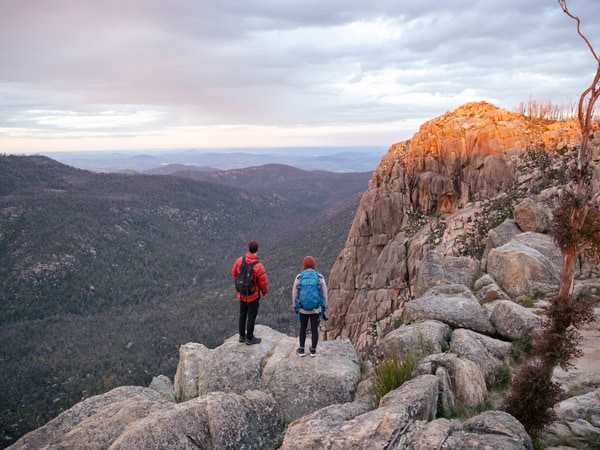
One of Namadgi’s best walks, hiking to Booroomba Rocks affords spectacular views. (Image: We Are Explorers for Visit Canberra)
Namadgi forms the northern tip of the Australian Alps, a rare environment covering just 0.15 per cent of the continent. It boasts Australia’s tallest mountain range and a variety of environments, from steep slopes to open plateaus and alpine meadows dotted with colourful seasonal wildflowers, fern-filled forests and rivers. It stretches across 1.6 million hectares, 12 national parks and reserves, two states and a territory, but is managed as one unique bioregion.
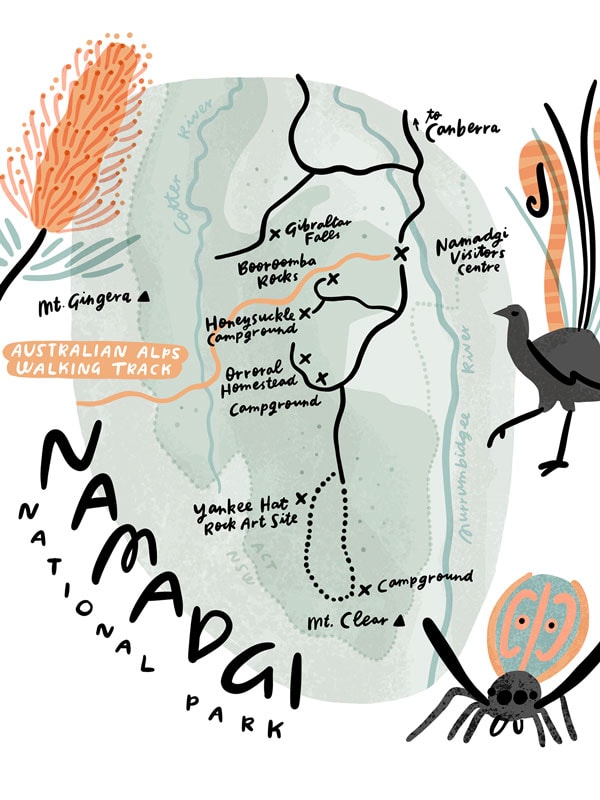
Map of Australian Alps Walking Track (Image: Mike Rossi)
With more than 170 kilometres of marked walking trails and more than 20 recommended tracks, bushwalkers are spoilt for choice. From a short waterfall stroll to a section of the famed Australian Alps Walking Track, heritage trails to walks by subalpine sphagnum bog ecosystems on Mt Gingera, options abound. Grab a map and guide for inspo and heed closures and conditions.
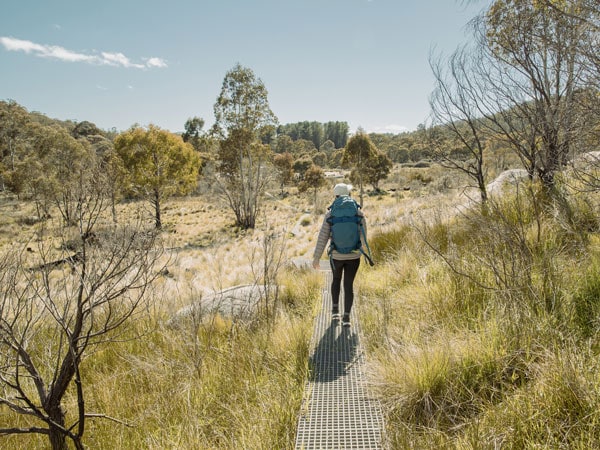
Stroll along the scenic walking trail. (Image: We Are Explorers for Visit Canberra)
Relish the open skies with remote wilderness camping or at one of three designated campgrounds – Orroral, Mt Clear or Honeysuckle where you can camp at the actual spot the world’s first vision of the moon landing was transmitted. While the historic huts aren’t for overnight stays, ‘Ready-Cut Cottage’ is available for hire to sleep up to seven.
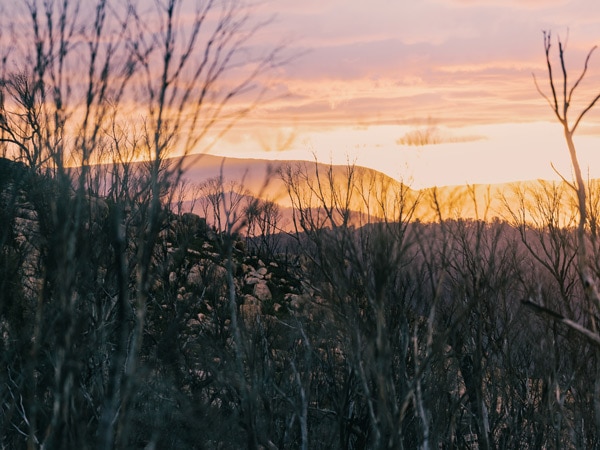
Capture amazing views over the valley. (Image: We Are Explorers for Visit Canberra)
More than 200 recorded Aboriginal sites indicate abundant food and shelter supported year-round habitation here. The annual harvesting of bogong moths brought groups from distant areas and an opportunity for trade and intermarriage. Dhawura Tours hope to restart custodian-led tours soon, after recent fires and floods.
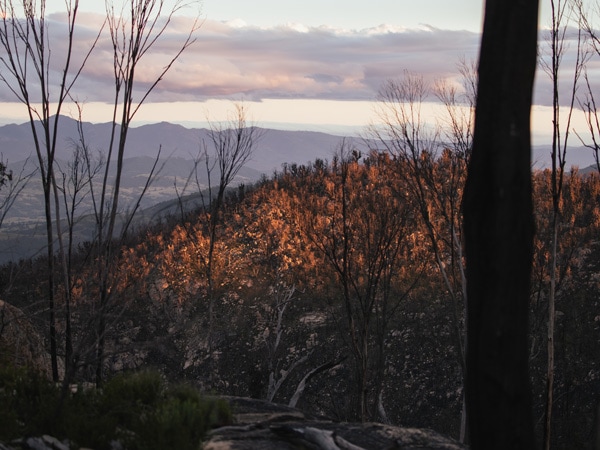
Follow the trail to reach stunning views. (Image: We Are Explorers for Visit Canberra)
Common sightings include ’roos and wallabies, wombats, gliders, lyrebirds and wedge-tailed eagles. Namadgi is also home to 13 threatened animal species.
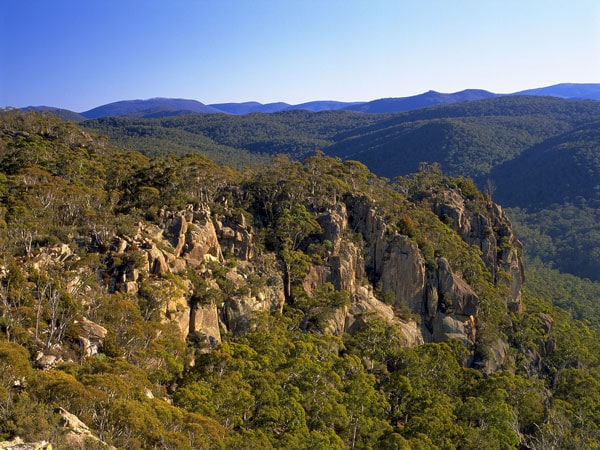
Diverse flora and fauna thrive in the region. (Image: Visit Canberra)
This boldly striped frog is about the size of a thumb tip. Once common in the wetlands, it’s now critically endangered and suffering from amphibian chytrid fungus with only 50–100 thought to remain in the wild in very selective areas of Namadgi and adjacent parts of NSW. Captive breeding programs hope to bolster wild populations.
Spring blankets the woodlands and heathlands with wildflowers: yellow and orange peas, daisies, grevilleas and flax lilies. Canberra’s floral emblem, the royal bluebell, grows in wet regions. Harder to spot is the reddish-purple Brindabella midge orchid, found nowhere else on Earth.
For thousands of years, millions of bogong moths have headed to the alps in a mass migration, to ‘aestivate’ in dark rock crevices over summer. Traditionally an important food source for Indigenous people, the moth has suffered a catastrophic population decline of 99.5 per cent in recent years. On the brink of extinction, this spring has provided some hope with sightings in the Brindabella mountains.
Testing a camera lens in 2008, Canberra local Stuart Harris snapped an unusual red-and-blue 4mm-long spider. It turns out, he’d found a new species of a tiny jumping spider. After 150 hours of searching for more than two years to find a live specimen, the Maratus harrisi is named after him.
Close to Woods Reserve campsite, Gibraltar Falls is a pretty waterfall with a 50-metre drop splashing over giant granite boulders. At the top, a series of rock pools has formed with amazing views over the valley. ACT Parks advises people not to swim above the waterfall for safety reasons.
Take the short track to the lookout for vistas over the falls and valley beneath. Ginini Falls, at 140 metres, is higher but off-track and best visited by experienced walkers.
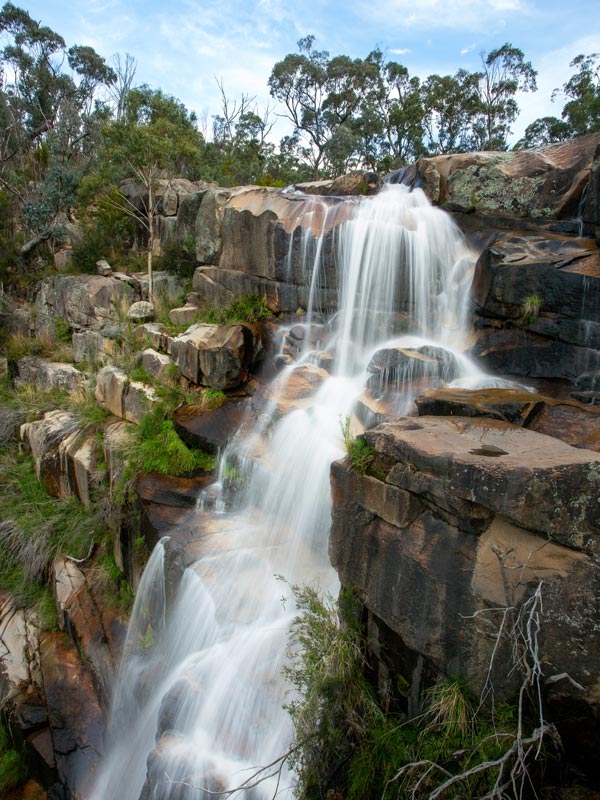
Admire the gushing waters of the pristine waterfall.
For the  best travel inspiration delivered straight to your door.
best travel inspiration delivered straight to your door.
LEAVE YOUR COMMENT